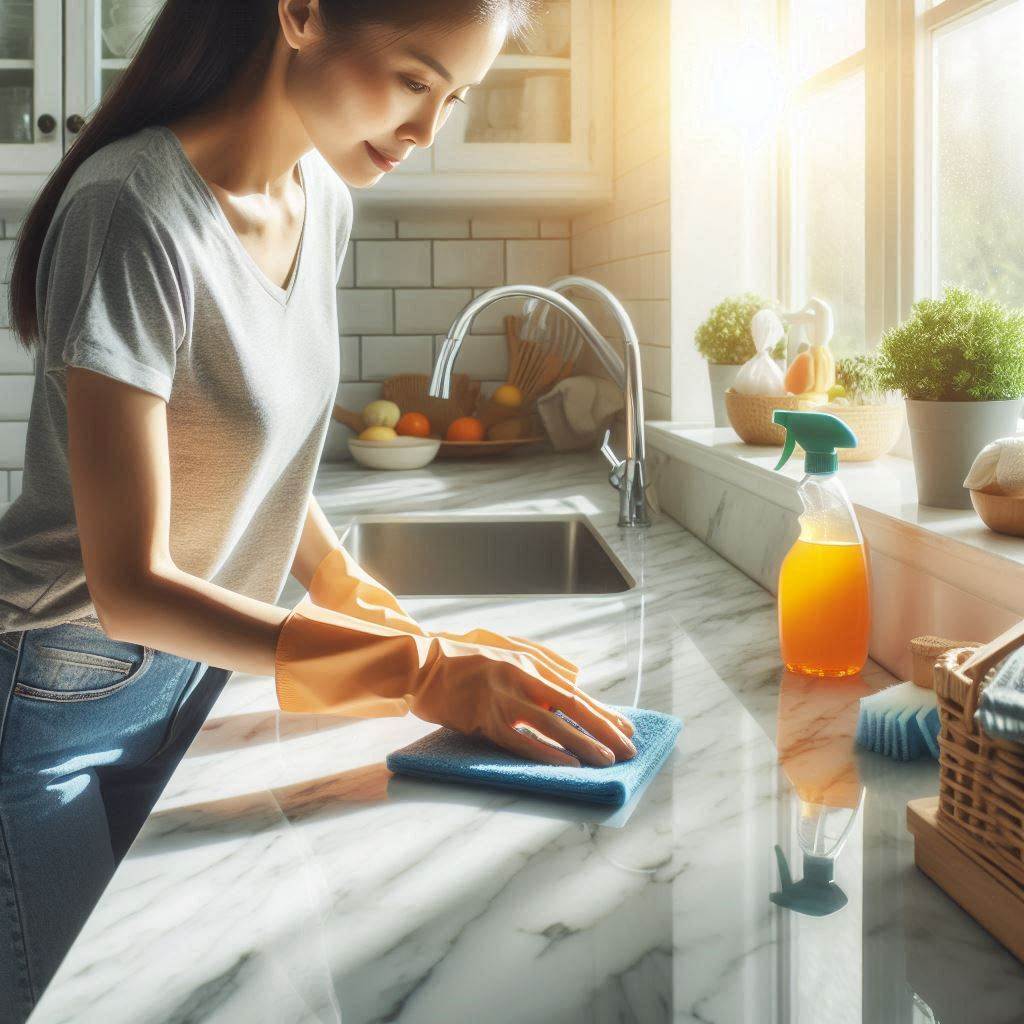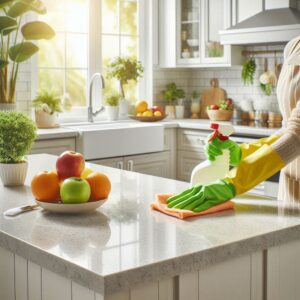Looking for how to clean Marble countertops? You are at the right place. As a countertop expert, we have prepared a detailed guide for you to clean marble countertops. We know a plus point for marble countertops lies in how they deliver classic beauty through their distinctive natural patterns.
Yet marble stands as a permeable material because it requires careful maintenance to uphold its beautiful appearance. This guide provides step-by-step instructions for how to remove stains from marble, along with guidance on the best marble countertop cleaner. Let’s dive in!
Why Special Care Is Needed for Marble Countertops
Marble counts as a less rigid stone type with larger openings than granite or quartz, thus making it vulnerable to staining and leaving marks and damage from acidic substances. Following the right cleaning method for marble countertops helps maintain their original shining surface, together with their original beauty. The correct and best marble countertop cleaner, combined with the application of sealant for marble countertops, will improve longevity. Due to these reasons, special care to clean marble countertops is needed.
How to Clean Marble Countertops Daily
Marble countertop cleaning during daily use does not need to be complicated. Gentle cleaning agents, along with the omission of acidic or abrasive substances, create the right approach. For daily cleaning, here is how to clean Marble countertops:
- Apply a soft piece of fabric or sponge to the surface by using subtle water temperatures.
- The solution requires a few drops of dish soap, which should be pH neutral.
- Clean the marble surface using circular movements without causing any scratches to appear.
- You should use water to wash the surface before drying it with a microfiber cloth to prevent water marks.
Selecting proper marble countertop cleaners made for natural stone will provide both safe and efficient care. The permanent damage that occurs to marble when using bleach together with vinegar and ammonia, both rank as chemical solutions that should never be employed for cleaning marble.
How To Remove Stains From Marble
Having stain removal skills for marble surfaces is essential because marble easily takes in spills without proper sealing.
A mixture of baking soda together with water functions as a soft and gentle cleaner for clearing both granite and marble stains coming from organic materials such as coffee or wine. Apply the paste onto the stained area and then wrap it with plastic before allowing it to sit overnight, before performing the wipe clean operation.
Marble stains from oil, such as grease or cosmetics, become easier to remove when you create a baking soda and acetone poultice. Rust stains need specialized marble stain removers alongside potential professional interventions to eliminate them effectively.
The Importance of Sealing Marble Countertops
Marble countertops need sealant application as a vital step for their maintenance. Sealant for marble countertops operates to fill marble pores and strengthen marble’s resistance against fluids and oils entering its surface. The routine of reapplication for marble countertop sealing should happen twice annually, based on how much you utilize them.
The inspection procedure for determining whether marble needs reapplication of sealer begins with this step.
- Droplets of water need to be placed on the marble surface.
- When water drops penetrate the marble, within minutes then it’s the right time to reapply the sealer.
Regular maintenance with sealing enables easy care routines as it prevents stains from appearing.
How to Clean Marble Tiles in the Bathroom
The cleaning process for bathroom marble tiles works in the same way.
- Always perform cleanups on marble surfaces with either a soft sponge or mop and pH-neutral cleaning products.
- Finish cleaning marble tiles by drying the surface so water spots and mineral buildup do not occur.
- To remove white spots from marble, you should use a water stain remover made for natural stones after ensuring its safety for marble surfaces.
- Regular tile cleaning and drying habits in bathrooms ensure both mildew prevention and hard water protection for marble surfaces.
How to Treat Water Stains That Appear on Marble Surfaces?
Here is a rapid solution for handling marble water stains:
- Light water stains fade away after delicate surface buffing with a smooth dry cleaning cloth.
- For deep stains it is necessary to use a polishing powder on marble surfaces applying it gently through a damp cloth.
- Test any product on a hidden spot before application to verify its safety for marble finishes.
Best Products for Marble Countertop Care
Select only cleaners that bear explicit natural stone labels for the cleaning of marble countertops. Popular options include pH-neutral stone cleaners. The diluted use of castile soap acts as an alternative DIY solution. The market offers ready-to-use marble countertop cleaners that provide gentle protective film coverage. Raw stone cleaners must be used because marble countertops have no tolerance for acidic elements, regardless of natural claims on product labels.
Any person interested in home projects can create their own easy DIY marble cleaner by mixing these ingredients in a spray bottle.
- 2 cups warm water
- A few drops of mild dish soap
- Pour ingredients together in a spray bottle, then use it for daily cleanings.
Final Tips for Cleaning and Caring for Marble Countertops
- Spills should receive immediate cleaning attention when they include acidic substances, including lemon juice, wine, and tomato sauce.
- Place decorative coasters together with cutting boards and trivets on the countertop to safeguard it.
- You should apply regular re-sealing procedures to marble countertops because this helps minimize staining and etching events.
- Harsh scrubbing pads, along with steel wool, should be avoided since they will create scratches on the surface.
- Use a recommended marble and granite stain remover for tough marks while reading the product instructions completely.





